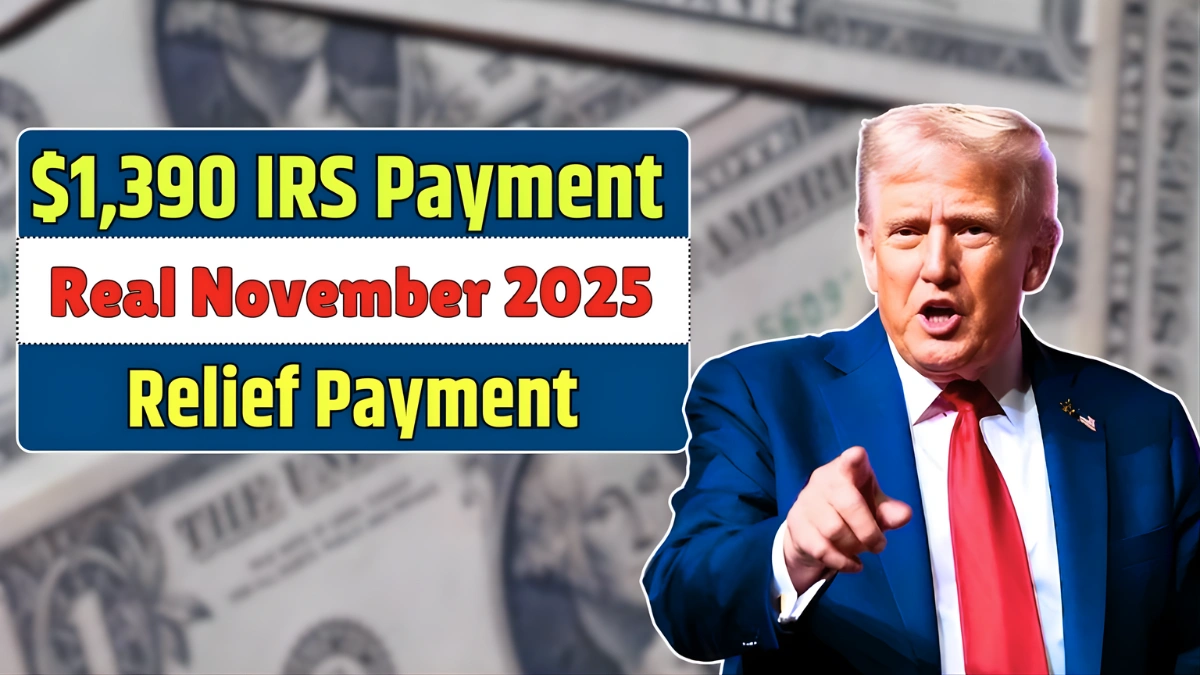A trending claim online says that the IRS is issuing a $1,390 relief payment in November 2025, leading millions of seniors, disability beneficiaries and taxpayers to wonder whether they will receive this deposit. With so many mixed messages circulating, it is important to separate verified facts from misinformation.
Here is the full, Google Discover–friendly explanation of the real meaning behind the $1,390 November deposit, who may actually receive this amount, and what the IRS has officially confirmed.
Is the $1,390 IRS Payment a Real Federal Relief Check?
There is no official federal stimulus or relief check for $1,390 approved for November 2025. The IRS has not announced any nationwide one-time payment of this amount.
The confusion comes from the fact that many Americans legitimately receive payments close to $1,390 every month through existing federal benefit programs. These routine deposits are often misrepresented online as new “IRS relief checks.”
Why $1,390 Is Trending Across Social Media
The amount $1,390 is common because it closely matches actual average federal benefits, especially after COLA adjustments. For example, many retirees receive monthly Social Security payments around $1,350–$1,430 depending on earnings history. Several SSDI recipients also receive checks in this range.
In addition, some taxpayers may receive IRS refund corrections, amended returns or back pay that total near $1,390, especially late in the year. This overlap fuels viral headlines suggesting a new stimulus payment exists.
Who Actually Receives Around $1,390 in November 2025?
While $1,390 is not a federal stimulus, millions will still receive deposits around this amount from real programs.
Social Security Retirees
Many retirees receive a monthly payment near $1,390 due to updated COLA increases and lifetime earnings averages.
SSDI Disability Beneficiaries
SSDI payments can fall in this range for workers with moderate or strong employment history before disability.
SSI + Social Security Dual Beneficiaries
Some individuals receiving both SSI and Social Security may see a combined payout close to this figure.
VA Disability Compensation
Veterans with certain disability ratings often receive monthly deposits between $1,200–$1,500.
IRS Late-Year Refunds
Some taxpayers may receive refund adjustments or corrections nearing $1,390 if filings were delayed or amended.
None of these represent a new “IRS relief” program — they are standard, recurring payments.
Actual November 2025 Payment Schedule (Verified)
Social Security & SSDI
Deposits depend on the beneficiary’s birth date:
• 1st–10th → Second Wednesday
• 11th–20th → Third Wednesday
• 21st–31st → Fourth Wednesday
SSI
SSI for November is paid on November 1, 2025, unless the date falls on a weekend, in which case payment arrives earlier.
VA Disability
VA benefits typically arrive on November 1 or on the last business day of October if the 1st falls on a weekend.
IRS Refunds and Adjustments
These are processed Monday–Friday based on individual case completion and are not tied to stimulus programs.
How to Check If YOU Will Get a Payment
To know exactly what you will receive in November, use official government tools:
SSA.gov (My Social Security Account) — lists retirement, SSDI and SSI payments
IRS.gov Refund Tools — shows refund or amended return status
VA.gov — confirms monthly disability pay amounts
Never trust unofficial websites or messages asking for your SSN, bank account, or login details. The IRS never sends texts, emails or calls asking for information to “release” a stimulus.
Conclusion: The claim that the IRS is issuing a $1,390 relief payment in November 2025 is not accurate. There is no new federal stimulus, but millions of Americans will still receive regular monthly deposits around that amount through Social Security, SSDI, SSI, VA benefits and IRS adjustments.
Understanding the official payment schedule is the best way to know whether you will receive a deposit in November.
Disclaimer: This article is based on verified 2025 information from SSA, IRS and VA. If new legislation emerges, payment rules may change.





